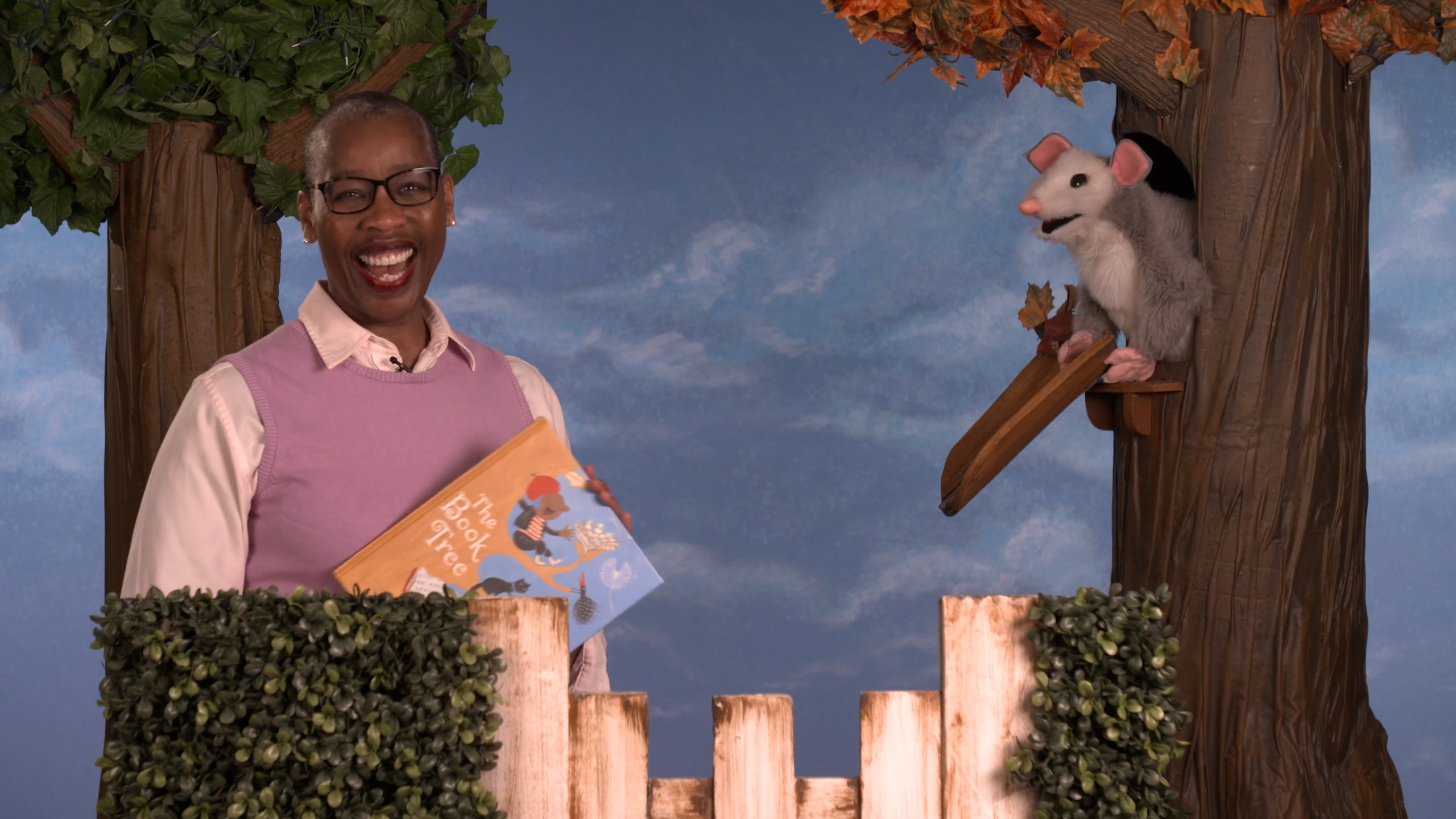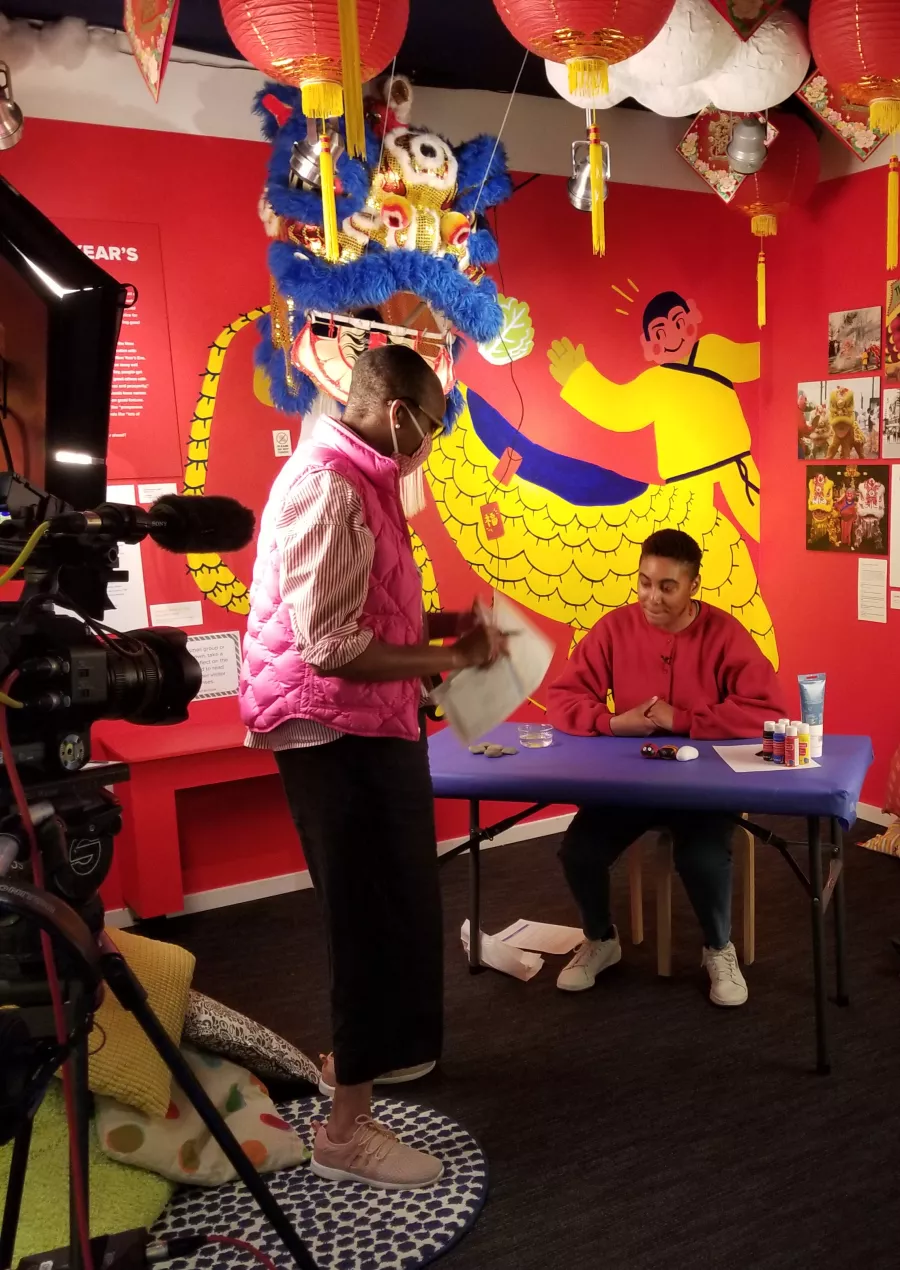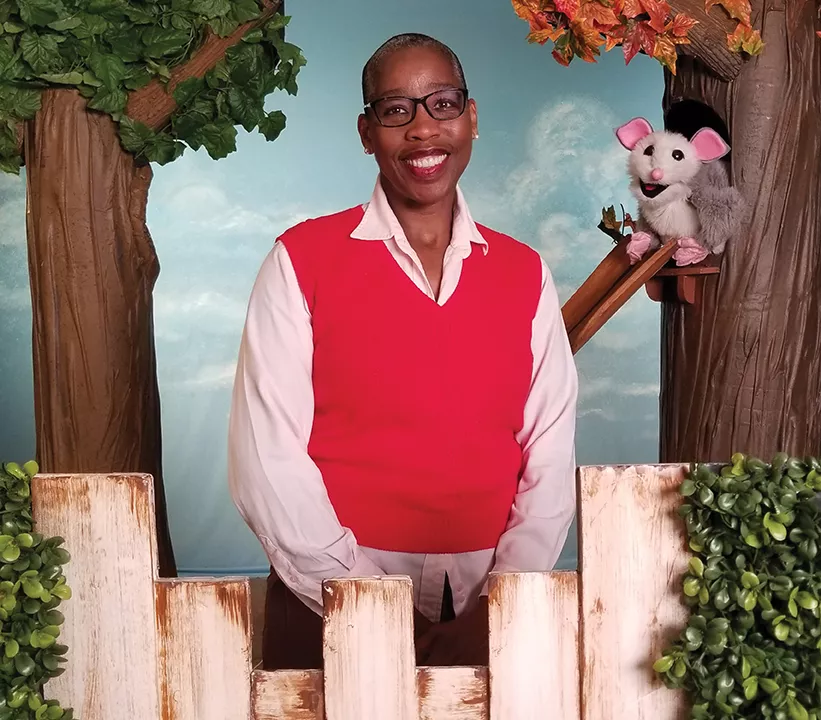Long before she created and hosted her own award-winning children’s TV show, “Look, Listen & Learn,” Val Thomas-Matson was a communication student at Western putting on a puppet show for her senior project. She can’t remember all the details, but she does remember the crew.
“I remember that thrill of having that all-women crew,” Thomas-Matson says. “I guess it was a foreshadowing of my feminist ways before we even had those terms.”
She left Western in 1981 knowing she wanted to work in children’s programming, but the desire to make a difference in children’s lives came well before she arrived on campus.
“I attended Seattle Public Schools, and I wasn’t one of those kids who did really well. Academics weren’t always easy for me,” says Thomas-Matson, who completed her bachelor’s degree in broadcast media studies in 1995. “I was fortunate I had this supportive community that wouldn’t let me fall. They kept pulling me up and helping me make it over the hurdles that I found myself encountering.”
When she made it to Western, she was immediately drawn to communication, inspired in part by the show that made the biggest impression on her childhood.
“I knew that I somehow wanted to make a difference and help other children, particularly children of color, to get a better foundational start in their education,” she says. “Mister Rogers had been such an influence in my life, and I felt that communications media was the way to help get more children and families invested earlier in early education learning.”
She backed up her communication studies with classes on early learning and childhood development, fueled by a fascination with the changing, growing child’s brain.
“In studying early child development, I realized that there are easy tools that people can use to set up lifelong learning benchmarks. There are tools that parents can use in the here and now to help their kids to be more curious and creative.”
It can be as simple as a parent being intentional about the world around them when they are with their child: talking about what a child is looking at, asking what children are thinking about, exploring questions about why things are the way they are.
“I believe that’s how the seeds are planted for learning, becoming curious about all different types of things.”
It got her thinking: Why couldn’t you take those principles of brain development and apply them to a TV show? The momentum and excitement around that idea grew as she realized that it was something she could excel at, as an extrovert with a love for theater and communication, and most of all, kids.
“I love children. I love the promise that they are,” she says. “It just made sense to me that this children’s programming idea was a way for me to make a difference and make a contribution. I left Western knowing I wanted to go into children’s programming.”
Auntie Lena and Possum
From there, Thomas-Matson’s character Auntie Lena and her puppet sidekick Possum were born, and the concept for “Look, Listen & Learn” was created.
Each episode focuses on a social-emotional theme pulled from early childhood development research: Auntie Lena and Possum talk about ideas such as being kind to yourself when you make mistakes, being a leader, and being kind to others. Since she had experience working in human services, Thomas-Matson knew she wanted to include real children in segments that relate to those themes filmed throughout King County: reading books with librarians at local libraries, cooking alongside local chefs at restaurants and doing art projects with local artists at museums.
It took many years, several jobs in the broadcast and public communications fields and a few iterations to bring that vision to life. After making her first demo for “Look, Listen & Learn” in 2005 and attempting to fundraise in the years following, that dream came to fruition in 2018 when she received a Best Starts for Kids Innovation Grant to get the show started and running on government-funded channels in King County.
“I know a lot of white early learning experts cringe at the notion of media time and screen time. And still, it is a reality, so can we use media for good? This is how I like to frame the media conversation,” she says.
“There is a buzz and energy in communities of color in having ourselves seen via this medium, and so government TV is a great way to provide greater access. Plus, the programming can be aired more than once a day.”
And it’s a great way for the preschool-aged children of color in her audience to finally see themselves represented on TV. “You’re the best you the world will see,” Thomas-Matson sings in the show’s opening song.
“It’s intentional that we are highlighting and broadcasting the brilliance of people of color for the enjoyment of everyone to see,” she says. “We want to share the joy and the brilliance of the families that we represent on this show. Oftentimes when we talk about equity, when we talk about inclusion and diversity, folks can feel apprehensive. I hope people watching ‘Look, Listen & Learn’ will get a dose of diversity, inclusion, equity and representation and get excited about the joy, the laughter, the creativity, the silliness that we’re having as we’re learning and discovering together.”
She also wanted to highlight locations that she knew would be welcoming for all families, particularly children of color, who in less-inclusive spaces may be seen as destructive rather than exploratory when engaged in the messy business of learning and creativity.
The goal of the show is to get preschool-aged children and their families excited about learning and discovery, with the hope of seeing more children of color prepared for kindergarten. Thomas-Matson references the substantially lower percentage of Black and Indigenous students who are kindergarten-ready in Washington as a stark example of the need for the show.
“The U.S. needs to champion the possibilities in all children. We need to especially celebrate the beauty and brilliance of Black and Brown children,“ Thomas-Matson says. “There are many unsolved problems, equations and mysteries that need solutions. We, the world, can’t afford to squander another Black or Brown early learner. White teachers must do their work so they can look into the eyes of every child and see endless possibilities. Then they must get to work to do all in their power to foster that brilliance. This is how we can change systems.”
Little kids asking big questions
The team was right in the middle of filming the show’s second season when the pandemic hit. Fortunately, the production company was able to quickly set up pandemic protocols to be able to shoot safely. The LL+L Production Team also came up with the idea for mini episodes filmed as a Zoom call between Auntie Lena and Possum. This allowed the show to address more immediate topics related to the pandemic, such as masking and boredom, as well as the killing of George Floyd, the protests that followed and why Black lives matter.
“It’s funny, because people (call these) ‘hard conversations’ and yet they’re the things kids are really inquisitive about. I’ve heard kids ask these questions or make these comments,” she says of the questions Possum asks Auntie Lena.
Season two of “Look, Listen & Learn” is now wrapped and on YouTube, and the accolades are starting to roll in. Thomas-Matson received this year’s Ginger Ackerley Community Service Award from the Seattle Storm. “Look, Listen & Learn” was nominated for two local Emmys, and won a 2021 Gold Telly for general children’s programming. “Receiving some early recognition after so many years is rewarding. But there’s so much work left to do. It’s only the beginning.”
As Thomas-Matson and her team prepare for their third season, she’s looking forward to keeping those mini episodes as a way to help parents and kids understand more urgent issues in the broader world, as well as expanding some of the locations to include Tacoma and Spokane. “People of color ask, where were you when I was growing up? And I tell them, I was right there with you, wanting this.”


